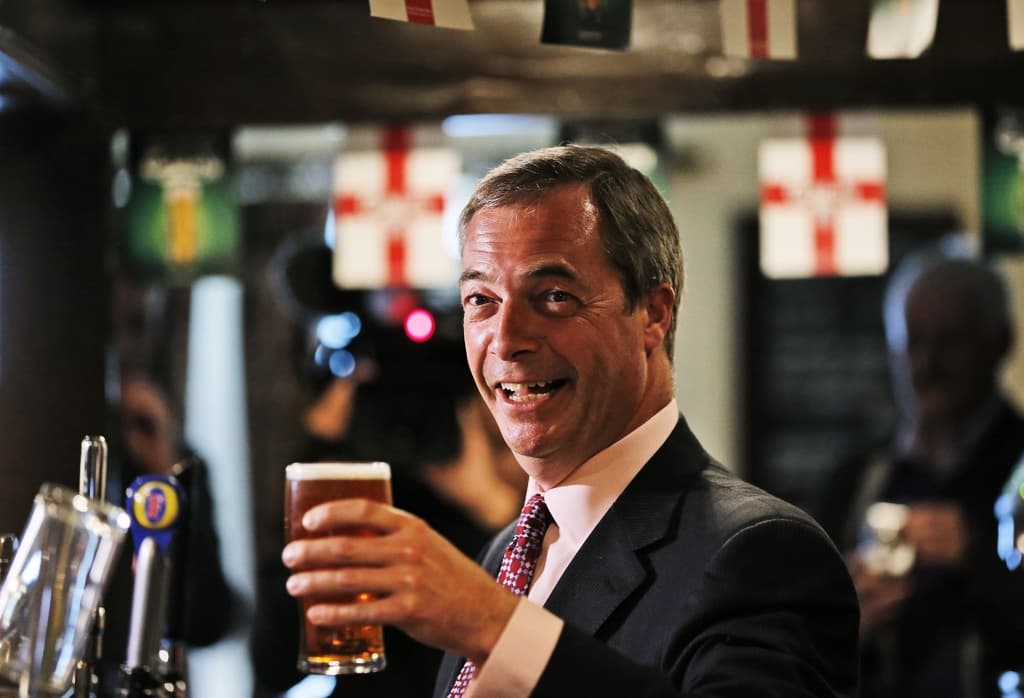Seven times he failed to get into the House of Commons. One of the times, he almost died from his own election banner.
But Nigel Farage is still seen as the politician who has changed the UK the most in recent decades.
The path was laid out in the early 1990s. The not yet 30-year-old Farage had been engaged in the Conservative Party. But like some other Brits, he thought the EU's new Maastricht Treaty expanded cooperation too much.
The year after the treaty, in the autumn of 1993, Farage helped found the "independence party" Ukip. Party leader became the then more well-known EU skeptic Alan Sked – who was later maneuvered out.
Get in
"The party came under the control of a flipped-out charlatan named Nigel Farage, who turned it to the far right", Sked wrote later according to British media. He describes Farage as a racist who attracts votes by scaring middle-of-the-road voters with what "the others", i.e. foreigners, are doing.
Few took the idea of leaving the EU seriously back then. But after several failures in British elections, Farage took the bull by the horns, ran in the EU election in 1999 – and got in.
The EU Parliament became the platform for Farage's outgoing personality. During the 2000s and 2010s, he was re-elected several times, and managed to bring a EU exit, "brexit", into the center of politics.
Still rejected
This despite established politicians' dismissive attitude, exemplified by the future Prime Minister David Cameron's description of Ukip in 2006:
A bunch of fruitcakes, loonies and closet racists.
At the same time, Farage continued to be rejected in national elections. And the candidacy in 2010 was about to end even worse than just with a loss. The then 46-year-old politician and a colleague were to spend election day in a small plane over England, with a long "Vote for Ukip" banner fluttering behind. But the banner got tangled in the tail section, and the plane crashed.
It was later described as a miracle that the two survived, in Farage's case with broken ribs and a punctured lung.
And in 2014, after several years of hard austerity under David Cameron, Ukip's first major electoral success came. Discontent with the bad times lifted the populist party to a sensation; most votes of all in the EU election.
Takes no chances
The same autumn, self-determination for Scotland was rejected in a referendum. This is believed to have strengthened Cameron's conviction that the EU issue could also be resolved in this way. The thesis was that Ukip would be "disarmed" through a stable yes to continued EU membership.
But the result was brexit, which was finally completed in 2020, whereupon Farage declared "the war is over" and withdrew from politics.
Until now. And this time, he takes no chances in the parliamentary election. Despite not living there, the 60-year-old is running in the seaside resort of Clacton-on-Sea, one of the brexit movement's strongest strongholds, and expects to get in.
Corrected: An earlier version contained an incorrect fact in the fact box regarding Farage's birth year.
Born April 3, 1964, in Farnborough outside London. Went to private school as a teenager in the capital and became a stockbroker.
Joined the Conservative Party, and even voted for the Green Party, before joining the then fairly peripheral EU-skeptical movement that would become the party Ukip.
Member of the EU Parliament 1999–2020. Now leads the populist party Reform UK. Lives in the picturesque village of Downe in the county of Kent.






